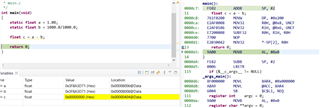Hi, TI
In my code,
static float foo=1.08; // hex value in memory for foo is 3F8A3D71, the actual float value = 1.08000004 foo = 1080.0 / 1000.0; // hex value in memory for foo becomes 3F8A3D70, the actual float value = 1.07999992
Since we calculate checksum based on hex content, checksum would return a different value even when the actual foo value for our purpose has not changed. Could you please advise whether is there a way that we can guarantee the hex value for the two steps remains the same? Also, please let me know if you need more info.
Many thanks,
Clio







